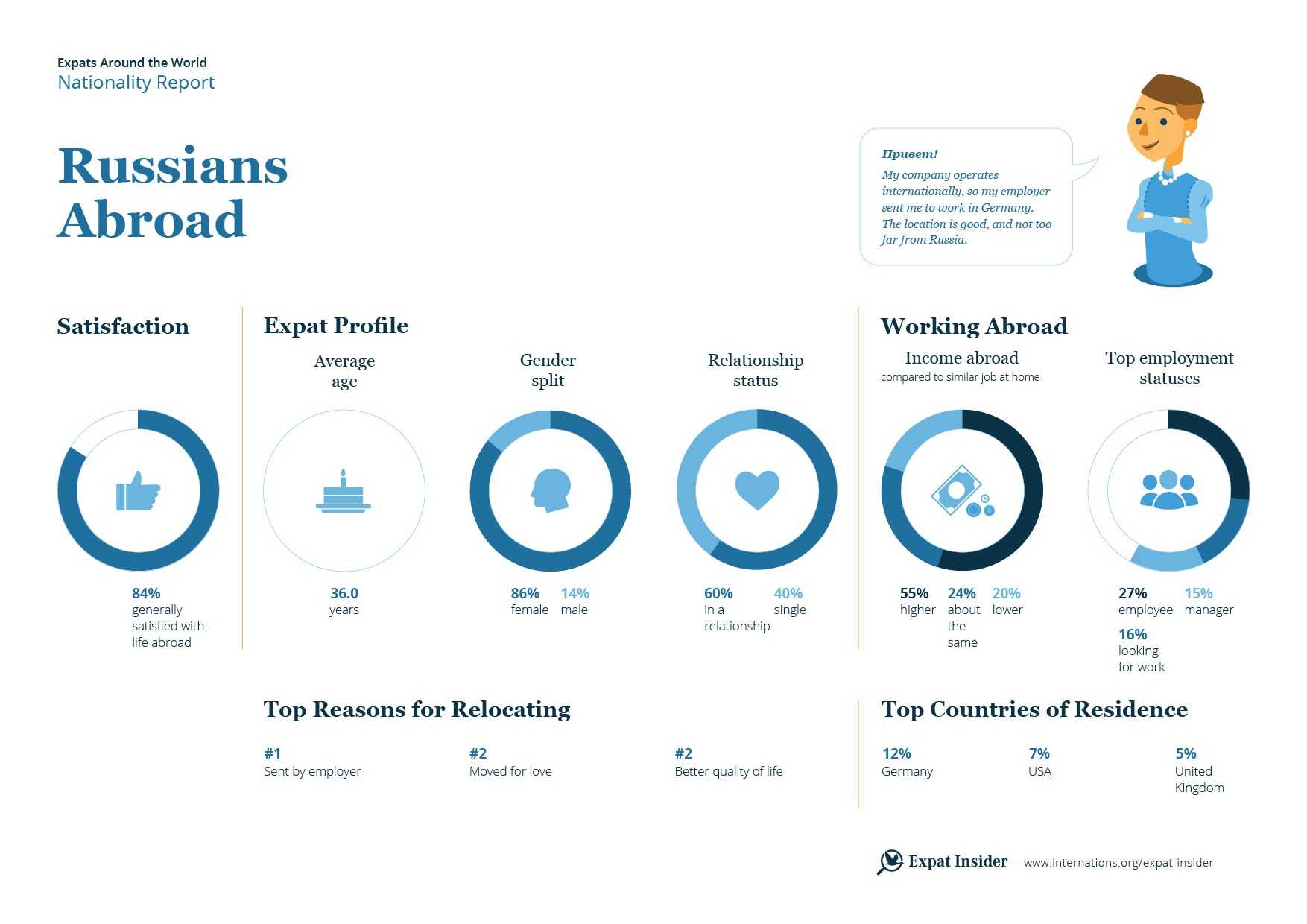Russian Expats Are Relocating with No Intention of Returning
Russian expats are not particularly experienced at living overseas, but, with more favorable political and economic situations abroad, many don’t plan to return home.
- 35% never want to return to Russia
- Political and economic stability were considered major advantages of relocating
- Nearly two-thirds (65%) happy with their jobs
- Linguistic abilities mean no problems with communication
- Over two-fifths (41%) have mostly expat friends

Leaving Home for Good
Russians are fairly inexperienced when it comes to life abroad: over two-fifths (41%) have been living in their current host country for less than two years, and two in five are currently living abroad for the very first time. This could be linked to the fact that Russian expats tend to be younger than their global counterparts, with an average age of 36 years (worldwide average: 43.5).
A lack of overseas experience could contribute to difficulties settling in, with 15% of Russian expats saying they don’t yet feel at home in their host country. However, Russian respondents seem to enjoy expat life: over four-fifths (84%) are generally satisfied with life abroad — six percentage points higher than the global average. Happiness overseas results in a lack of desire to return home, and over a third (35%) say it’s not at all likely that they will ever return to Russia.
Moving for Safety and Security
Over two-fifths of Russian respondents (41%) saw the political situation in their future home as a potential benefit prior to moving. This could be a result of Russia’s current political situation, with corruption, increasingly tight media controls, and a heightening sense of nationalism often surfacing in the international news. It might also explain why political, religious, and safety reasons were cited as a reason for moving abroad by one in ten Russians.
Nearly half (49%) also saw the economy and/or labor market abroad as a potential benefit. This could be linked to economic problems in Russia: stock markets have failed to recover since plummeting in 2015, and the economy is extremely regionalized, with over a fifth of the country’s wealth being generated in Moscow and the surrounding area. In contrast, the countries that Russians typically move to have very strong economies: the US (where 7% of Russian respondents currently live) has the strongest economy in the world, and Germany (the most popular destination among Russian expats) represents 4.5% of the world’s economy. This may explain why over three-fifths of Russian respondents (62%) rank their host country’s economy favorably.
High Job Satisfaction despite Low Wages
Around one in seven Russian expats working abroad (15%) are managers and, of these, more than one-third (34%) work in top management. Despite career success, only 57% rate their financial situation positively — seven percentage points lower than the global average. Russians do earn less than their global counterparts: nearly two-thirds (65%) only have access to an annual household income of under 50,000 USD.
Nevertheless, 65% of Russians rate their job satisfaction positively, and two-thirds are happy with their work-life balance. This could be connected to the fact that Germany, the most popular destination for Russian expats, offers employees one of the best work-life balance ratios in the world, coming eighth in the OECD work-life ranking. The fact that nearly a quarter of Russians abroad (24%) work part-time might also explain their satisfaction with work-life balance. For the 76% that are working full-time, the workweek stands at 42.4 hours — nearly two hours less than the worldwide average of 44.3 hours. This could explain why nearly seven in ten (68%) are happy with their working hours.
Linguistic Experts
Over a third of Russian expats (34%) can speak the local language(s) of their host country very well — ten percentage points higher than the global average. They also have no problem picking up languages, with over two-fifths (43%) stating that learning the local language(s) is easy. It’s fortunate that Russians are such linguistic experts — half believe it would be difficult to live in their host country without speaking the local language. One respondent in Germany even states that you need a “decent level of German to survive”.
The Search for Love and Friendship Abroad
More than a tenth of Russians (11%) moved overseas for love; however, this figure is slightly higher among female respondents (13%), making this the most popular reason for moving abroad among Russian women. Generally, Russian expats are much more likely to be female (86%), and these women tend to be in very international relationships: only around a fifth of Russian women in a relationship (21%) have a Russian partner, compared to 43% of expat women globally who are in a relationship with someone with the same nationality.
What’s more, nearly seven in ten female Russian expats (69%) met their other half outside of Russia, with 46% finding love in their host country. Although 15% are in a long-distance relationship, and international love often comes with challenges, Russian women tend to be happy with their relationship, which only 5% rate negatively.
In general, Russians are equally satisfied with their social circle: over four-fifths (82%) rate the friendliness of their host country’s population positively, and nearly three-fifths (58%) find it easy to make new friends. This might be related to the fact that three in ten Russian expats (30%) already had friends or family members living in their host country. Social circles also reflect these established networks: 41% say they’re mainly friends with other expats — eight percentage points higher than the global average.
Further Reading
- Forbes: This is Russia’s Biggest Problem
- BBC: Russia country profile
- World Economic Forum: The world’s 10 biggest economies in 2017
- OECD Better Life Index: Work-Life Balance
- Expat Insider 2017 — Russia: Cold Weather and a Welcome to Match
- Expat Insider 2015 — Expats from Russia Are in It for the Long Haul
Advertisement
Join InterNations
The community for expats worldwide
Download

